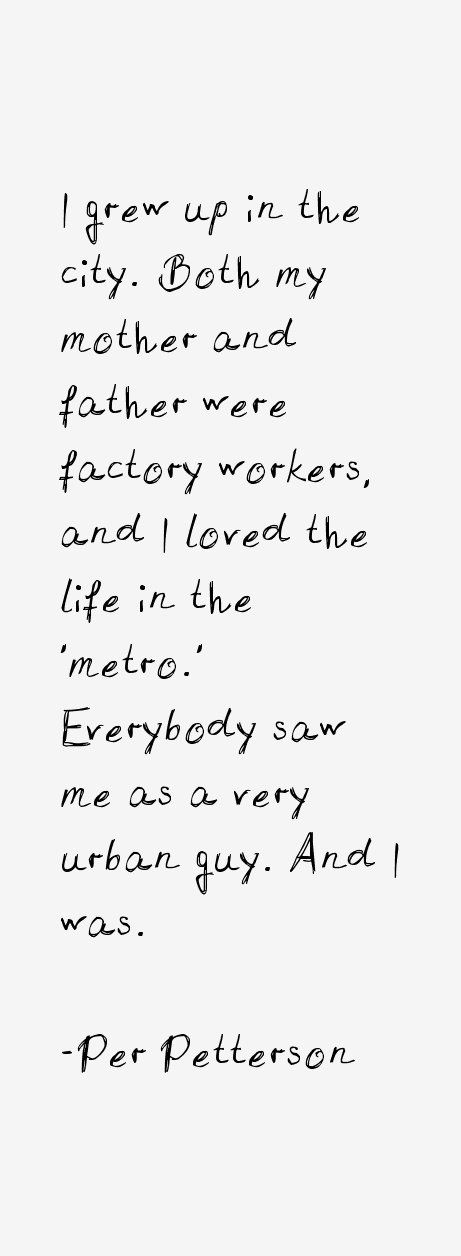Per Petterson Quotes & Sayings (Page 3)
Per Petterson quotes and sayings page 3 (novelist). Here's quote # 21 through 30 out of the 31 we have.

“I grew up in the city. Both my mother and father were factory workers, and I loved the life in the 'metro.' Everybody saw me as a very urban guy. And I was.”
“I was born in 1952, so obviously the sixties were important. That's when I came of age. It was also a revolutionary period, a complete break with the generation before us in terms of culture, literature, music, and in politics, of course. 1968 was an important year; I was 16, and the world became clear to me, visible, so to say.”
“Living here where I live, on a farm way out in the countryside, in the woods, in fact, I have plenty of time to be alone, and I like it. I always have. I like my own company. And I am not the only one who feels this way; a high percentage of the Norwegian population feel as I do.”
“Philosophically I am, or at least have been, a follower of Sartre. I am very interested in the choices we make, or don't make, in life-defining matters. That moment of 'angst' and its consequences can be such a cruel thing.”
“Some critics said, 'Hey, why are you writing historical novels?' I say they're not historical, they're contemporary, because people walking around who lived through this, even a little bit, they carry it inside. The contemporary isn't just what you can see now.”
“The important discovery I made very early is that my novels had to be written without any given plan or outline. I can't do it in any other way. But then they are dependent on the sentences, my intuition, and, as I have experienced many times, the subconscious.”
“There is always this quarrel about what is preferable: the straight, naturalistic, epic storytelling or the modernistic, disjointed, slightly hermetic one. To me it does not matter, as long as it's good. I like both kinds. Although the common reader seems to prefer the first, which is to be expected, and who would blame her?”
“To me, a book is a book. A novel is a novel, and you have hundreds of possibilities, options, and they may all be fine. Charles Dickens or Ingeborg Bachmann, Claude Simon or later writers. The one and only condition is that it has to be good: it has to have quality, substance, atmosphere.”
“To say that a family is happy I think is to diminish it, taking out what is interesting. Growing up, I don't think my family was any happier or unhappier than anyone else's. My mother and father should have been divorced or never even married. On the other hand, I remember many moments of happiness.”
“When a translation is very good, it is fascinating to see how the book changes and yet stays the same. I think 'Out Stealing Horses' sounds more American for Americans than it does in Norway, and still, it is all there, everything that I wrote. It's amazing.”
Per Petterson Quotes Rating
No Ratings Yet
Leave A Comment
























